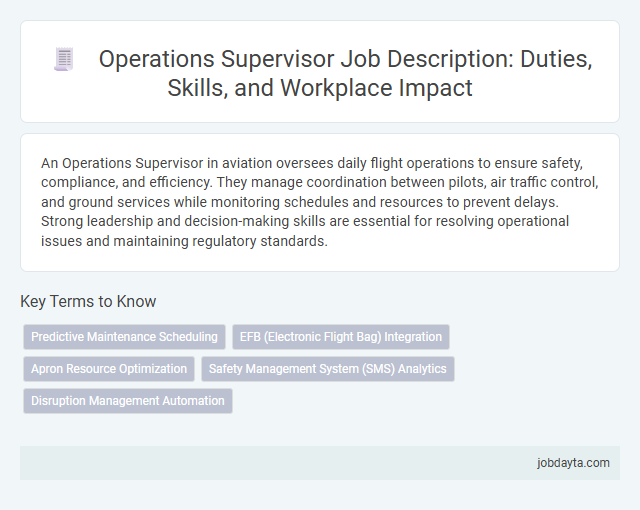An Operations Supervisor in aviation oversees daily flight operations to ensure safety, compliance, and efficiency. They manage coordination between pilots, air traffic control, and ground services while monitoring schedules and resources to prevent delays. Strong leadership and decision-making skills are essential for resolving operational issues and maintaining regulatory standards.
Overview of an Operations Supervisor in Aviation
An Operations Supervisor in aviation manages daily flight operations to ensure safety, efficiency, and compliance with regulatory standards. This role involves coordinating between ground staff, flight crews, and air traffic control to maintain smooth airport and airline functions.
You oversee scheduling, monitor operational performance, and handle unexpected issues to minimize delays and disruptions. Strong leadership and problem-solving skills are essential for optimizing both passenger experience and operational productivity.
Key Responsibilities and Duties
An Operations Supervisor in aviation ensures the smooth execution of flight and ground operations while maintaining safety and efficiency standards. This role requires strong leadership and coordination skills to manage teams and operational processes.
- Oversee Daily Operations - Manage and supervise all flight and ground activities to ensure compliance with regulatory requirements and operational procedures.
- Coordinate Team Efforts - Lead and support staff to optimize workflow, improve communication, and enhance overall team performance.
- Monitor Safety Protocols - Enforce strict adherence to safety regulations and conduct regular audits to mitigate risks and maintain operational integrity.
Essential Skills for Aviation Operations Supervisors
An Operations Supervisor in aviation requires strong leadership and communication skills to oversee daily activities efficiently. Understanding regulatory compliance and safety protocols is essential to maintaining smooth operations.
Attention to detail ensures accuracy in flight scheduling and resource allocation within the team. Problem-solving abilities help manage unexpected challenges such as delays or emergencies. Your capability to coordinate between departments enhances overall operational performance and safety.
Educational and Certification Requirements
| Role | Operations Supervisor - Aviation |
|---|---|
| Educational Requirements |
|
| Certification Requirements |
|
| Experience Requirements |
|
Managing Daily Flight Operations
What are the primary responsibilities of an Operations Supervisor in managing daily flight operations? The Operations Supervisor ensures smooth coordination between flight crews, ground staff, and air traffic control to maintain efficient schedules. They monitor operational performance and resolve issues that could disrupt flight safety and punctuality.
Ensuring Safety and Regulatory Compliance
The Operations Supervisor plays a critical role in maintaining safety standards and ensuring regulatory compliance within aviation operations. This position requires constant oversight of protocols and adherence to aviation laws to prevent incidents and promote efficient workflow.
- Safety Management - The supervisor implements and monitors safety procedures to mitigate risks and ensure a secure working environment.
- Regulatory Compliance - Ensures all aviation operations comply with national and international aviation regulations and standards.
- Team Coordination - Leads and coordinates operational teams to guarantee smooth execution of safety and compliance measures.
Strong leadership and thorough knowledge of aviation regulations are essential for success in this role.
Leadership and Team Management in Aviation
Operations Supervisors play a crucial role in aviation by leading ground and flight teams to ensure safety and efficiency. Effective leadership and team management skills are essential to coordinate complex operations and maintain high performance.
- Strategic Leadership - You guide aviation teams through dynamic environments to achieve operational excellence and compliance with regulations.
- Conflict Resolution - Skilled in managing interpersonal challenges, ensuring seamless collaboration among diverse aviation personnel.
- Performance Monitoring - Continuously evaluates team productivity and implements improvements for optimized aviation operations.
Problem-Solving and Crisis Management
An Operations Supervisor in aviation plays a critical role in overseeing daily activities to ensure smooth and safe flight operations. They employ advanced problem-solving skills to quickly address unexpected issues such as technical malfunctions or scheduling conflicts. Effective crisis management is essential, enabling rapid decision-making to minimize delays and maintain passenger safety during emergencies.
Impact on Aviation Workplace Efficiency
The Operations Supervisor in aviation plays a critical role in coordinating daily activities to ensure seamless workflow and maximize resource utilization. Their oversight enhances communication between teams, reduces delays, and improves adherence to safety protocols, directly boosting operational efficiency. Effective supervision leads to optimized scheduling, quicker decision-making, and minimized disruptions, significantly impacting overall workplace productivity.
Career Growth and Development Opportunities
The role of an Operations Supervisor in aviation offers extensive career growth and development opportunities within the industry. Supervisors gain hands-on experience managing complex logistics and team coordination critical to airport and airline operations.
Advancing in this career often leads to higher management positions such as Operations Manager or Director roles. Your leadership skills and operational knowledge become invaluable assets for long-term success and professional development.
Related Important Terms
Predictive Maintenance Scheduling
Operations Supervisors in aviation optimize predictive maintenance scheduling by analyzing aircraft performance data and maintenance trends to prevent unscheduled downtime and enhance fleet reliability. Leveraging advanced predictive analytics tools, they coordinate maintenance tasks proactively, minimizing aircraft ground time and ensuring compliance with safety regulations.
EFB (Electronic Flight Bag) Integration
Operations Supervisors oversee the seamless integration and management of Electronic Flight Bag (EFB) systems to enhance cockpit efficiency and compliance with aviation regulations. They coordinate real-time data updates and troubleshoot EFB software to ensure operational readiness and reduce flight delays.
Apron Resource Optimization
Operations Supervisors enhance apron resource optimization by coordinating aircraft movements, ground handling, and staffing schedules to minimize turnaround times and improve operational efficiency. Leveraging real-time data analytics, they allocate equipment and personnel precisely, reducing delays and maximizing apron utilization in aviation operations.
Safety Management System (SMS) Analytics
Operations Supervisors in aviation leverage Safety Management System (SMS) Analytics to monitor safety performance indicators and identify risk patterns across flight operations. Utilizing data-driven insights from SMS tools enhances proactive hazard mitigation, regulatory compliance, and overall operational safety.
Disruption Management Automation
Operations Supervisors leverage disruption management automation to enhance real-time decision-making and minimize delays during irregular operations. Automated systems integrate flight data, crew availability, and weather conditions to optimize resource allocation and maintain operational continuity.
Operations Supervisor Infographic

 jobdayta.com
jobdayta.com